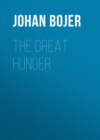Объем 250 страниц
О книге
In Johan Bojer's poignant novel, «The Great Hunger,» readers are drawn into the harrowing world of rural Norway during the devastating 1860s famine. Bojer employs a rich, lyrical style, deftly capturing the emotional landscape of his characters as they navigate through despair, resilience, and the harsh realities of agricultural life. The narrative not only reflects the physical starvation inflicted by nature but also the psychological and cultural hunger that haunts the human spirit. Set against the backdrop of a changing Norway, the novel serves as both a social commentary and a testament to the enduring strength of human relationships amidst adversity. Johan Bojer was born in 1872 and grew up in a farming community deeply affected by economic and environmental challenges, which profoundly shaped his worldview. His background, coupled with a keen sense of social justice, informed his portrayal of characters who are representative of the struggles faced by ordinary Norwegians. A notable contemporary of Henrik Ibsen, Bojer's commitment to exploring themes of societal struggle and cultural identity is evident throughout his body of work. «The Great Hunger» is a compelling read for those interested in the intersection of history, literature, and human resilience. Bojer's vivid storytelling and rich character development will resonate with anyone seeking to understand the complexities of survival and the profound impact of nature on human lives. This novel not only enriches our understanding of Norwegian history but also leaves a lasting impression of courage against the backdrop of insurmountable odds.











